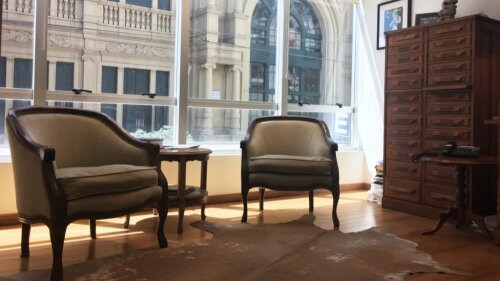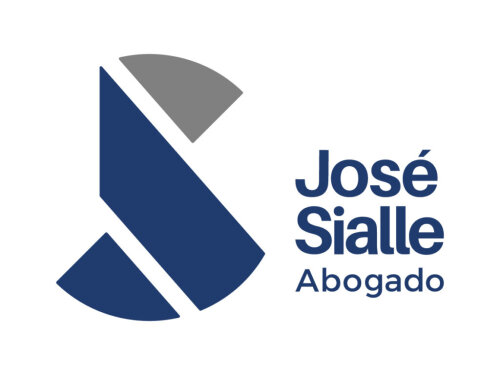Best Admiralty & Maritime Lawyers in Córdoba
Share your needs with us, get contacted by law firms.
Free. Takes 2 min.
List of the best lawyers in Córdoba, Argentina
About Admiralty & Maritime Law in Córdoba, Argentina
Admiralty and maritime law governs legal relationships, rights and obligations arising from activities on navigable waters. In Argentina this field is primarily regulated at the national level, which means federal rules, regulations and courts apply even when a maritime incident involves parties or assets located in the province of Córdoba. Córdoba is an inland province without direct access to the sea, but maritime and admiralty issues can still arise there - for example when companies and individuals based in Córdoba own vessels, operate on inland waterways, charter vessels that call Argentine ports, import or export goods by sea, insure ships, or employ seafarers. For many maritime matters the relevant authorities, documentation and enforcement mechanisms are national or located in port provinces, but the legal advice and litigation or arbitration can often involve lawyers based in Córdoba who coordinate with national authorities and courts.
Why You May Need a Lawyer
You may need a maritime lawyer in Córdoba if you face any dispute or regulatory issue tied to vessels, cargo, crew or marine operations. Typical scenarios include vessel accidents and collisions, injury to crew or passengers, claims for lost or damaged cargo, disputes under charterparties and bills of lading, salvage and towage matters, pollution and environmental claims, vessel arrests and maritime liens, problems with vessel registration or flag state compliance, insurance recoveries and bad faith denials by P&I clubs or insurers, and cross-border trade or customs disputes that hinge on shipping documentation. You may also need help to interpret international conventions that Argentina has adopted, to negotiate or draft maritime contracts, or to represent you in federal courts or arbitration forums.
Local Laws Overview
Federal framework - Admiralty and maritime matters in Argentina are largely governed by national law and fall within federal jurisdiction. This means federal courts and federal administrative agencies handle most disputes, enforcement and regulatory oversight. If a maritime incident has a connection to Córdoba - for example the claimant or defendant is based in Córdoba, or evidence and witnesses are there - local counsel will coordinate with federal authorities and courts.
International conventions - Argentina is party to a number of international maritime conventions and treaties that affect liability, carriage of goods, pollution and safety. Where Argentina has ratified a convention, it is applied through domestic law and administrative practice. Counsel will check which conventions are relevant to a particular case and whether they have been incorporated into domestic law.
Vessel registration and flag state rules - Vessel registration is regulated at the national level. Ownership, mortgage and registration matters are important for establishing rights, priorities and for enforcing maritime liens. A vessel owned by a Córdoba company but registered under an Argentine flag will be subject to Argentine registry rules and oversight.
Safety, inspections and enforcement - Maritime safety, crew certification and inspections are managed by national authorities. The Argentine Naval Prefecture - Prefectura Naval Argentina - enforces navigation safety, pollution prevention and inland waterway rules. Port state control and port operations are handled by national or provincial port authorities in the provinces with ports.
Crew rights and labour - Seafarers' rights, wages, repatriation and social security issues have both national and international dimensions. Argentine labour and social security rules apply to employees based in Argentina, and specific protections for seafarers may apply under national law and ratified international instruments.
Cargo claims, bills of lading and contracts - Claims for loss or damage to cargo are handled under the applicable contract terms - most commonly bills of lading, multimodal contracts or charterparties - and under the relevant domestic or international carriage rules incorporated into Argentine law. Time-limits and limitation of liability regimes are important in these claims.
Vessel arrest and maritime liens - Arrest of vessels to secure maritime claims is available under Argentine law, but practical arrest requires the vessel to be within Argentine jurisdiction and usually physically present in a port or navigable water under Argentine control. The remedies and priorities for maritime liens are determined by federal law and relevant registry entries.
Statutes of limitation and procedural issues - Time limits for maritime claims vary by claim type and may be strict. Procedural rules for federal courts, evidence preservation, provisional measures and injunctions are all important considerations when preparing a maritime case from Córdoba.
Frequently Asked Questions
Can I bring an admiralty or maritime claim from Córdoba even though the province is landlocked?
Yes. Because admiralty and maritime law is a matter of federal jurisdiction, you can bring claims in federal courts that have competence over maritime matters. Many maritime disputes involve parties or evidence in Córdoba, and local lawyers can represent you and coordinate with federal courts or arbitral tribunals. Practical issues - for example arresting a vessel - require the vessel to be within Argentine jurisdiction, which often means a port in a coastal province.
Who enforces maritime safety and pollution rules in Argentina?
The Argentine Naval Prefecture enforces safety, navigation and pollution-prevention rules on the nation's waterways and ports. Other national agencies - including components of the Ministry of Transport and port authorities - also have regulatory and inspection roles. Enforcement of environmental claims may involve additional national or provincial environmental authorities depending on the location and nature of the incident.
What should I do immediately after a collision or accident involving a vessel?
Ensure safety and medical care for anyone injured, preserve evidence and records such as logbooks and photographs, notify the appropriate authority - typically the Prefectura Naval or local port authority - and contact your insurer or P&I club. Avoid admitting fault publicly, and consult a maritime lawyer promptly to preserve your rights and to obtain provisional measures if needed.
How do maritime arrests work in Argentina and can my claim be secured from Córdoba?
A vessel can be arrested in Argentina to secure maritime claims, but the vessel must be within Argentine jurisdiction. If the vessel is located in a coastal province or navigable water under Argentine control, you can ask a federal court to issue an arrest order. From Córdoba, a claimant can instruct counsel to bring an arrest application in the appropriate port jurisdiction, and local evidence or witnesses in Córdoba can be used to support the application.
What documents are important to prepare for a cargo damage or loss claim?
Important documents include bills of lading, charterparties, commercial invoices, packing lists, survey and inspection reports, photographs, delivery receipts, communications with carriers or agents, insurance policies and any certificates of condition issued at loading and discharge. Preserving originals and getting timely surveys is often critical for a successful claim.
How are crew claims - such as unpaid wages or injury - handled under Argentine law?
Crew claims are taken seriously under Argentine law and may involve both national labour protections and maritime-specific rules. Seafarers can claim unpaid wages, medical care, repatriation and social security benefits. Claims may proceed in federal courts or through administrative channels. Prompt legal assistance helps secure provisional relief and repatriation when needed.
Does Argentina apply international maritime conventions and how does that affect my case?
Argentina has ratified and implemented a number of international maritime conventions. Where a convention has been incorporated into domestic law, it will affect liability regimes, safety standards and documentation requirements. A lawyer will check the specific conventions relevant to your dispute - for example those governing carriage of goods, salvage, or pollution - and apply them alongside national law.
Can disputes be resolved by arbitration rather than court litigation?
Yes. Many maritime contracts - charterparties, shipbuilding agreements and bills of lading - include arbitration clauses. Arbitration is a common way to resolve international maritime disputes. Whether arbitration is available depends on the contract terms and the parties involved. A maritime lawyer can advise on the enforceability of arbitration clauses and the practicalities of pursuing arbitration from Córdoba.
How long do I have to bring a maritime claim in Argentina?
Time-limits vary by claim type and the governing law or contract. Some claims have short prescription periods, others longer ones. Because limitation periods can be strict and sometimes start to run from the date of the incident or from knowledge of damage, it is important to consult a lawyer promptly to avoid losing rights through delay.
How do I find and choose a qualified maritime lawyer in Córdoba?
Look for lawyers or law firms with experience in admiralty and maritime matters, preferably with experience in federal courts and with national maritime authorities. Ask about their experience with similar cases - for example cargo claims, vessel arrests, or crew claims - and whether they work with national counsel in port jurisdictions when necessary. Confirm language capabilities if you need assistance in Spanish, discuss fee arrangements and request references or case studies where available. The Colegio de Abogados de Córdoba can help verify credentials and standing.
Additional Resources
Prefectura Naval Argentina - the national authority responsible for navigation safety and enforcement on Argentine waters. Ministerio de Transporte - national ministry that oversees ports, maritime regulation and transport policy. Federal Courts of Argentina - for jurisdiction and filings in admiralty and maritime litigation. Colegio de Abogados de Córdoba - local bar association for verifying lawyers and finding counsel. Port authorities and terminal operators in coastal provinces - relevant when a vessel or cargo issue involves ports outside Córdoba. P&I clubs and marine insurers - for claims handling and assistance with salvage and liabilities. International Maritime Organization - for information on international conventions that may affect Argentine maritime law. Maritime legal publications and local law journals - for commentary on case law and legislative changes in Argentina.
Next Steps
If you need legal assistance in admiralty or maritime matters and are based in Córdoba, start by gathering key documents - contracts, bills of lading, vessel registration, insurance policies, incident reports, photographs and witness details. Do not destroy evidence, and avoid making admissions of fault. Contact a maritime lawyer promptly to review jurisdiction, time-limits and provisional measures that may be available. In your first meeting be prepared to provide a clear timeline of events, copies of documents and a summary of losses or injuries. Ask the lawyer about likely actions - for example sending preservation requests, filing for provisional relief, pursuing negotiation or arbitration, or initiating federal court proceedings - and discuss fee arrangements and estimated costs. If you cannot afford private counsel, ask about public legal aid options or whether a lawyer will take the matter on a contingency or fixed-fee basis. Timely legal advice and early case management often preserve rights and improve the prospects of a favorable outcome.
Lawzana helps you find the best lawyers and law firms in Córdoba through a curated and pre-screened list of qualified legal professionals. Our platform offers rankings and detailed profiles of attorneys and law firms, allowing you to compare based on practice areas, including Admiralty & Maritime, experience, and client feedback.
Each profile includes a description of the firm's areas of practice, client reviews, team members and partners, year of establishment, spoken languages, office locations, contact information, social media presence, and any published articles or resources. Most firms on our platform speak English and are experienced in both local and international legal matters.
Get a quote from top-rated law firms in Córdoba, Argentina — quickly, securely, and without unnecessary hassle.
Disclaimer:
The information provided on this page is for general informational purposes only and does not constitute legal advice. While we strive to ensure the accuracy and relevance of the content, legal information may change over time, and interpretations of the law can vary. You should always consult with a qualified legal professional for advice specific to your situation.
We disclaim all liability for actions taken or not taken based on the content of this page. If you believe any information is incorrect or outdated, please contact us, and we will review and update it where appropriate.













